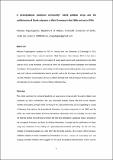Files in this item
A (trans)national emotional community? Greek political songs and the politicisation of Greek migrants in West Germany in the 1960s and early 1970s
Item metadata
| dc.contributor.author | Papadogiannis, Nikolaos | |
| dc.date.accessioned | 2015-09-21T14:40:03Z | |
| dc.date.available | 2015-09-21T14:40:03Z | |
| dc.date.issued | 2014-11 | |
| dc.identifier | 218448022 | |
| dc.identifier | 15948f9d-2056-454c-bd8d-d1acc6ef03ee | |
| dc.identifier | 84911107492 | |
| dc.identifier | 000342920200006 | |
| dc.identifier.citation | Papadogiannis , N 2014 , ' A (trans)national emotional community? Greek political songs and the politicisation of Greek migrants in West Germany in the 1960s and early 1970s ' , Contemporary European History , vol. 23 , no. 4 , pp. 589-614 . https://doi.org/10.1017/S0960777314000332 | en |
| dc.identifier.issn | 0960-7773 | |
| dc.identifier.other | ORCID: /0000-0002-3521-8152/work/87846162 | |
| dc.identifier.uri | https://hdl.handle.net/10023/7520 | |
| dc.description.abstract | This article examines the emotional standards and experiences connected with the entehno laiko music composed by Mikis Theodorakis that was immensely popular among left-wing Greek migrants, workers and students, living in West Germany in the 1960s and the early 1970s. Expanding on a body of literature that explores the transnational dimensions of protest movements in the 1960s and the 1970s, the article demonstrates that these transnational dimensions were not mutually exclusive with the fact that at least some of those protestors felt that they belonged to a particular nation. Drawing on the conceptual framework put forth by Barbara Rosenwein, it argues that the performance of these songs was conducive to the making of a (trans)national emotional community. On the one hand, for Greek left-wingers residing in West Germany and, after 1967, for Greek centrists too, the collective singing of music composed by Theodorakis initially served as a means of ‘overcoming fear’ and of forging committed militants who struggled for the social and political transformation of their country of origin. On the other, from the late 1960s onwards those migrants increasingly enacted this emotional community with local activists from West Germany as well. | |
| dc.format.extent | 586868 | |
| dc.language.iso | eng | |
| dc.relation.ispartof | Contemporary European History | en |
| dc.subject | Migration | en |
| dc.subject | Music | en |
| dc.subject | Emotions | en |
| dc.subject | Emotional communities | en |
| dc.subject | D901 Europe (General) | en |
| dc.subject.lcc | D901 | en |
| dc.title | A (trans)national emotional community? Greek political songs and the politicisation of Greek migrants in West Germany in the 1960s and early 1970s | en |
| dc.type | Journal article | en |
| dc.contributor.institution | University of St Andrews. School of History | en |
| dc.identifier.doi | https://doi.org/10.1017/S0960777314000332 | |
| dc.description.status | Peer reviewed | en |
This item appears in the following Collection(s)
Items in the St Andrews Research Repository are protected by copyright, with all rights reserved, unless otherwise indicated.

